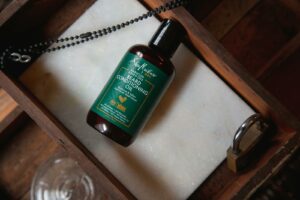It’s no secret that many men grow beards in order to cover up acne on their faces. Can beard oil cause acne, or is it something else? In this article, we’ll take a look at some of the research on this topic and try to answer that question.
What is beard oil, and what are its benefits?
Beard oil is a product that’s designed to be used on facial hair, usually by men who have beards. It’s made from a variety of natural ingredients, including carrier oils and essential oils. The purpose of beard oil is to moisturize the hair and skin, reduce itchiness, and make the beard look healthier and more styled.
There are a number of different carrier oils that can be used in beard oil, but the most common ones are jojoba oil, sweet almond oil, and argan oil. These oils are chosen for their ability to penetrate the hair shaft and provide nutrients to the hair follicle.
Essential oils are also added to beard oil for their scent, but they also have some benefits for the hair and skin. The most common essential oils used in beard oil are lemon, eucalyptus, rosemary, and peppermint. These essential oils can help to reduce inflammation, fight infection, and stimulate hair growth.
Can Beard Oil Cause Acne?
Does oil cause acne breakouts? Many people tend to think that oil and acne go hand-in-hand, but does this also hold true for beard oil? In other words, can beard oil cause clogged pores and lead to an acne breakout?
The answer is: it depends. This largely has to do with the types of ingredients used in the product, as well as how you use and apply beard oil.
Let’s start with the beard oil ingredients. As we mentioned before, beard oil is typically made from a combination of carrier oils and essential oils. The carrier oils used can greatly affect whether or not the product will cause acne.
For example, jojoba oil and sweet almond oil are both non-comedogenic, meaning that they won’t clog pores. On the other hand, coconut oil is known to be comedogenic and could potentially cause breakouts. So, if you’re concerned about acne, you’ll want to make sure that the beard oil you choose does not contain coconut oil.
As for how you apply and use beard oil, this can also affect whether or not it will cause breakouts. It’s important to remember that a little goes a long way with this product. Too much beard oil can actually end up clogging pores and causing breakouts.
To avoid this, make sure that you start with just a few drops of oil and work your way up as needed. Also, be sure to massage the oil into your skin and beard thoroughly so that it’s evenly distributed. And lastly, always wash your face before applying beard oil to remove any dirt and debris that could potentially clog pores.
In conclusion, yes, beard oil can cause acne breakouts if you’re not careful. However, this is typically only the case if the product contains comedogenic ingredients or if you use too much of it. So, as long as you choose a non-comedogenic beard oil and use it sparingly, you should be in the clear!
- SheaMoisture Maracuja Oil & Shea Butter Beard Conditioning Oil is our best beard care to moisturize and soften your beard
- Keep your beard in check with our conditioning oil. Our beard care combines Maracuja oil and shea butter to leave your beard looking, feeling and smelling great
- This beard oil for men is made with Fair Trade shea butter
- After using our Beard Wash and drying beard, apply a few drops to fingertips and massage into beard from root to ends. For thick, coarse hair, apply more conditioning oil to your beard care regimen
- This beard oil is formulated with no parabens, no phthalates, no mineral oil or petrolatum
How to choose the right beard oil for your skin type?
When it comes to grooming, every man has his own preferences. Some men prefer a clean-shaven look, while others let their facial hair grow wild and untamed. However, if you’re in the latter camp, it’s important to take proper care of your beard. Depending on your skin type, you may need to use different products to keep your beard looking its best.
For example, those with dry skin may benefit from using a beard oil that is rich in moisture. Those with oily skin, on the other hand, may need an oil that helps to regulate sebum production. In addition, those with sensitive skin may need to avoid harsh chemicals and opt for an all-natural product. By taking the time to find the right beard oil for your skin type, you can ensure that your facial hair always looks its best.
How to use beard oil properly?
Now that you know how to choose the right beard oil for your skin type, it’s time to learn how to use it properly. First and foremost, you’ll want to start with a clean face. Wash your face with a gentle cleanser and pat it dry. Next, take a few drops of oil and rub it between your hands. Then, massage the oil into your skin and beard, making sure to evenly distribute it.
Beard oils typically need to be reapplied every few days to keep your beard looking its best. However, you may need to apply it more often if you have a particularly dry or oily beard. As always, start with a small amount of oil and increase as needed.
By following these simple tips, you can ensure that your beard always looks its best.
Tips for keeping your beard healthy and looking good
No matter what type of beard you have, there are a few general tips you can follow to keep it healthy and looking its best. First and foremost, make sure to wash your beard regularly. Depending on your hair type, you may need to wash it daily or just a few times per week. However, it’s important to avoid using harsh cleansers as these can strip away the natural oils that keep your beard healthy.
In addition, make sure to brush your beard regularly. This will help to distribute the natural oils evenly and keep your beard from looking frizzy or unkempt. Finally, be sure to trim your beard regularly to avoid split ends and give it a neat, tidy appearance.
Final thoughts on can beard oil cause acne
While beard oil can cause acne if you’re not careful, this is typically only the case if you use too much of it or if the product contains comedogenic ingredients. So, as long as you choose a non-comedogenic beard oil and use it sparingly, you should be in the clear! In addition, be sure to follow the tips above to keep your beard healthy and looking its best.
- Can Beard Oil Cause Acne
- Can I Use Hair Dye On My Beard
- Can I Wear Black Jeans To An Interview
- Can Men Wear White To A Wedding
- Can You Use Beard Oil On Hair
- Can You Use Clippers On Wet Hair
- Can You Wear A Blue Shirt With Blue Jeans
- Can You Wear A Bow Tie With A Suit
- Can You Wear A Brown Belt With Black Pants
- Can You Wear A Hat To A Funeral
- Can You Wear A Hat To An Interview
- Can You Wear A Tie With A Short Sleeve Shirt
- Can You Wear A White Shirt To A Wedding
- Can You Wear Boots With Shorts
- Can You Wear Color To An Interview
- Can You Wear Corduroy In The Summer
- Can You Wear Cufflinks Without A Jacket
- Can You Wear Dress Shoes With Shorts
- Can You Wear Grey To A Funeral
- Can You Wear Jeans To A Wedding
- Can You Wear Khakis To A Funeral
- Can You Wear Leggings To Work
- Can You Wear Loafers With A Suit
- Can You Wear Navy To A Funeral
- Can You Wear Sandals To An Interview



